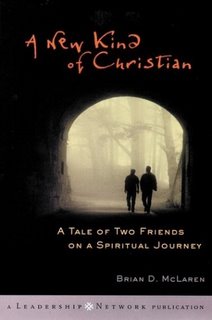A New Kind of Christian

Summarize
Brian Mclaren’s book “A New Kind of Christian” explores several shifts in theology, culture and philosophy using a novel/narrative style. Polarizing and divisive issues like evolution, postmodernism, hell, evangelism and the Gospel message are discussed through characters in conversation and relationship. Through their struggle for understanding the reader is given permission to engage in what has sometimes been a taboo conversation and line of questioning. In the process a New Kind of Christian emerges who seeks to survive and thrive in a new world. The books acts as a primer for continued conversation and begins to paint what a Christian in a postmodern world might look like.
Observe
A New Kind of Christian, is a tale of two friends on a spiritual journey, but it's also a description of the author's own spiritual journey. McLaren seems to be taking us into his own story and insights. Even though the book is packaged as a novel each chapter has a specific focus and purpose it hopes to achieve. The end notes for each chapter are a helpful place to discover the theologians and practitioners who have directed Brian’s thinking. Great resource books are referenced to process each thought provoking idea and ideological shift. In some ways it is a reading list for A New Kind of Christian including authors like Lenard Sweet, Stanley Grenz, NT Wright and Dallas Willard. .
Believe
The most helpful dimension of McLaren’s book is not Neo’s (character Neil Edward Oliver) articulate explanations for a new understanding of science, the Bible, the Kingdom of God, or education (those were great). Instead, I believe the true genius of Brian’s book is the detailed reactions of those with whom Neo relates with. The feelings and thoughts Pastor Dan and other congregation members express are the struggles a majority of people are having with these shifts. There is a normalizing effect that takes place through reading about the anxiety and fears of others. Pastor Dan is soaking up a great deal of what Neo has to say, but at several points (in reference to hell and other religions) he cannot handle the discussion and “freaks out.” Another helpful interaction is outlined in the last chapter of the book involving a youth worker, angry parents, and a senior pastor. The parent reaction is one that should be expected when they feel their children are being led astray, but through the patience and generous spirit of the pastor and youth workers the situation is eventually diffused. I believe the book provides a helpful picture of the long dialogue and hard work that will be required to emerge as New Kinds of Christians.
Doubt
Two themes that categorize many of the topics in the book are a call to diversity and interdependence. McLaren calls for softening our rhetoric (e.g., replacing good and bad with appropriate and inappropriate[1]). However, in many ways Neo speaks about a modernity that is bad if not evil. “the modern version of Christianity that you have learned from your parents, your Sunday school teachers, and even your campus ministries is destined to be a medieval cathedral. It’s over, or almost over,”[2] It seems possible if not probable for this to encourage many young readers to discard the faith they learned from their mentors. At times McLaren reinforces many dichotomies which follow the modern routine of forcing people to label concepts good or bad. In fact, a Christian could possibly care about being saved from Hell and sin, about getting into Heaven and being good, about having our sins forgiven and being good neighbors.[3]
McLaren’s intention seemed to be a transition from modern individualism to interdependence. Unfortunately, in many respects Neo often looks like a rugged individualist who refers to his church community experiences with a great deal of pessimism. At one point he makes the comment that he had become “isolated as a member of a religious sub-culture”[4] and this experience had not served him well in the long run. His alternative community included swimming with dolphins and going to soccer games with non-Christian friends. These activities illustrate how a Christian might enter into the reconciling work of God in the world. However, it does not illustrate the interdependence of an open community were Christian and non Christian seek and worship God. Neo provides a great example of a missional life on an individual level, but greater questions of community are left relatively unexplored.
Assess
McLaren calls all those who read this book to a self-examination of our “own modern viewpoint.”[5] I found this journey to be both exciting and difficult to navigate. McLaren also says that he hopes for every reader that “you will feel you have made real progress when you turn the last page.”[6] The conversations shared by Dan and Neo provide both hope and confidence for more Christians to engage in these important conversations and debates. The format of the book was critical to its ability to bring issues people are afraid of through a side door. McLaren uses his characters to share his own wisdom and depth as a pastor. While discussing deep seeded theological issues and the postmodern shift the reader is exposed to great pastoral care and relational reconciliation.
[1] Pg 22
[2] Pg 29
[3] Pg 130
[4] Pg 116-117
[5] 35
[6] (xviii)

0 Comments:
Post a Comment
Subscribe to Post Comments [Atom]
<< Home